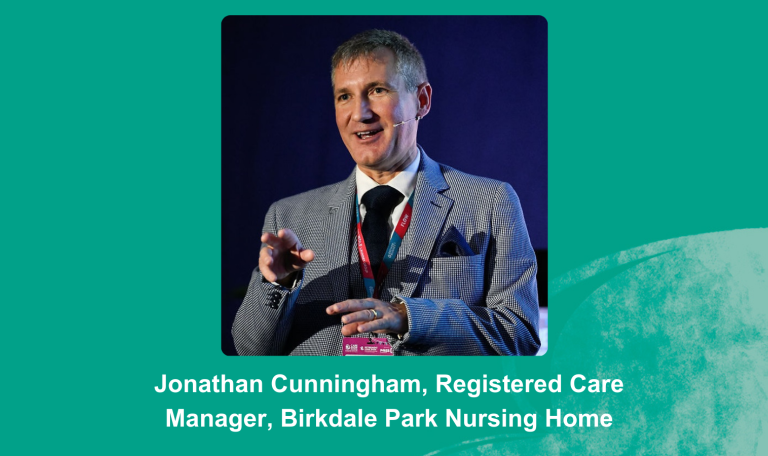Opening doors with military precision

Registered care manager Jonathan Cunningham explains how they took a high speed approach to digitisation and haven’t looked back since, helping them work in partnership with friends and families.
Here at Birkdale Park Nursing Home in Southport, we went digital in 24 hours back in 2017. My background in the forces, before I came to help my Mum run the home for a few weeks (about eight years ago now...!) probably had some influence in how we drove change fast.
During my time serving in the army I was involved in the use of digital approaches to track armoured vehicles in Iraq. We knew pretty much where every vehicle was on the battlefied. Fast forward to my move to the care sector and I couldn't even have told you how many people were in our beds! We had appalling records. So, I knew digitisation was going to be a change agent.
In terms of selection and implementation, we involved all of the staff, from carers on the floor to senior managers and nurses. We asked them all to be part of the selection process and we chose our digital social care record provider in line with their views. And that’s because it’s not really about the technology change - it’s about cultural change.
Our family portal function is called the ‘Relatives Gateway’. This certainly sounded interesting, but I thought it was way down the line. But then Covid came along and sped up the process – we gave families access to as much as possible, because they weren’t allowed to come and visit. And we have never looked back.
This function allows families to look at everything from assessments and care plans to daily records and activities. In my view, there are five key advantages.
The first one is that it gives massive reassurance if you're a family member that you can see your loved one’s records live. Families, or friends – anyone with Lasting Power of Attorney - can find out everything from what they had for breakfast to whether their blood pressure is high or low and where they spent the day.
They can also see the digital assessment records and they can challenge those. That's exactly what we want: to be honest, open and transparent. We want to work in care partnership with our families. And if they see something's not right, we want them to tell us.
Naturally, this caused some nervousness amongst some of our team. But I’ve always assured them, and the families of people in our care, that if we don’t get things right, I am accountable and I will do all I can to make sure things are right.
The second advantage is that it allows families to be massively involved. Care plans are shaped with them. This really helps us to work in partnership.
Thirdly – you go global. Our care home went from this little, local home on Lulworth Road in Southport to the world. We've got family and friends in Ireland, France, Australia, South Africa and Brazil. What’s more, it enables engagement between families and multi-disciplinary teams of professionals involved in their loves one’s care, including social workers, psychologists, commissioners – all of whom can be given temporary access when required.
Number four is feedback. We all hear regularly from the CQC about the importance of feedback and how we respond to it. With the friends and family portal function, people can tell you directly their thoughts on the care being given, what they are happy with and what they're not happy with – and it comes in bucketfuls. We record all that, and it’s the best evidence ever.
Fifth and finally, it is a great selling point for your service. And we’re all businesses. The generation making many of the decisions are not the ones in our care – it’s the families of those people, and they like and want the tech.
I’m not going to pretend it’s all rosy. There are challenges. Yes it means that you are open to questions and scrutiny and challenge. If you have great relations with the families of people in your care - you haven’t got a problem. Where relations are strained, it can be tricky. But we have found it actually helps us improve those relationships.
On occasion, people may misinterpret clinical notes or the language is hard to understand, but they can, and often do, ask our team to explain. Sometimes we have found the friends and family portal highlights strained relationships or lack of communication within families. It can help us to understand and even bridge those gaps.
The future is open. My advice is…open your doors because relatives have a right to understand and to scrutinise our work, and to see the data, as long as it's appropriate and in line with GDPR. Jump on board the digital bus with your team, and embrace not just digitisation, but also family and friends.